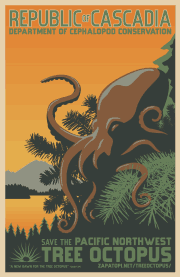
It's a cephalod, it spends part of it's life cycle in trees in the Oregan rainforest, it's an endangered species, and over 90% of people who learned about it on the internet think it actually exists. A study at the University of Connecticut by Donald Leu, who researches literacy and technology, introduced 48 students to a website on the mythic Northwest Pacific Tree Octopus. Nearly 90% of the the 48 participants decided that the website was a reliable source of information and was not a joke, even though the site has links to conservation organaizations such as "greenpeas" and even though it offers the disclaimer that "This site is not associated with any school or educational organization,other than the Kelvinic University branch of the Wild Haggis Conservation Society."
Our house is currently embroiled in a larger debate on whether the internet is good for knowledge and cognition. My wife Kay is firmly in the camp of Nicholas Carr, whose piece "Is Google Making Us Stoopid?" appeared recently in Atlantic Magazine. “What the Net seems to be doing is chipping away my capacity for concentration and contemplation,” he wrote, confessing that he now found it difficult to read long books. A friend of mine who teaches history at a major Canadian university has made comments which seem to confirm Leu's study, and has to carefully restrict his students from using unauthorized internet sources in their papers.
Since I'm the glass is half full type, I'd like to believe the parent quoted in Motoko Rich's article in a recent New York Times, who argues that her kids reading something, even if online, is better than not reading at all. Perhaps the icon of literacy for the next generation will be the open laptop rather than the open book.
Read the whole article.


3 comments:
I think part of the problem isn't of Internet origin, but predates it. We're such a clock-driven society that allowing any time for thought, contemplation, and intellegent research and discussion is, well, old school. Veruca Salt, the movie character, not the band, said it well: "I want it all and I want it now." Google didn't _make_ us stupid [sic], we like it that way.
Oh, we do have a Tree Octopus out here. I hope that doesn't mess up your argument. ;)
This post is really thought provoking. Thanks for writing it.
The Point being made by the Leu study is that we have to teach students new strategies for reading comprehension that include validating the reliability and credibility of information found on the Internet. The Internet is not making us stupid! Only the refusal to teach information literacy and strategies to use the Internet in ways that help students construct valid and meaningful knowledge is! This refusal is driven by people who resist acknowledging the multimodal texts of the Internet as legitimate texts for learning.
Post a Comment